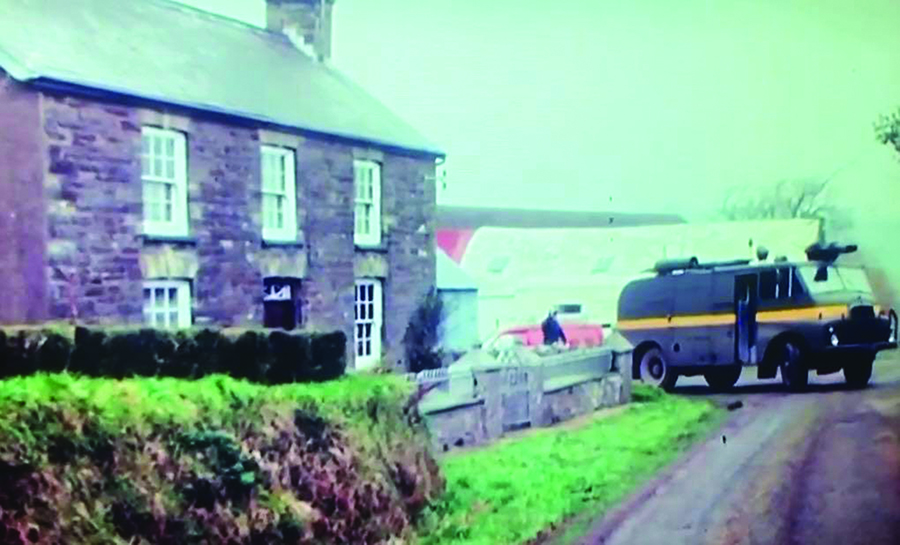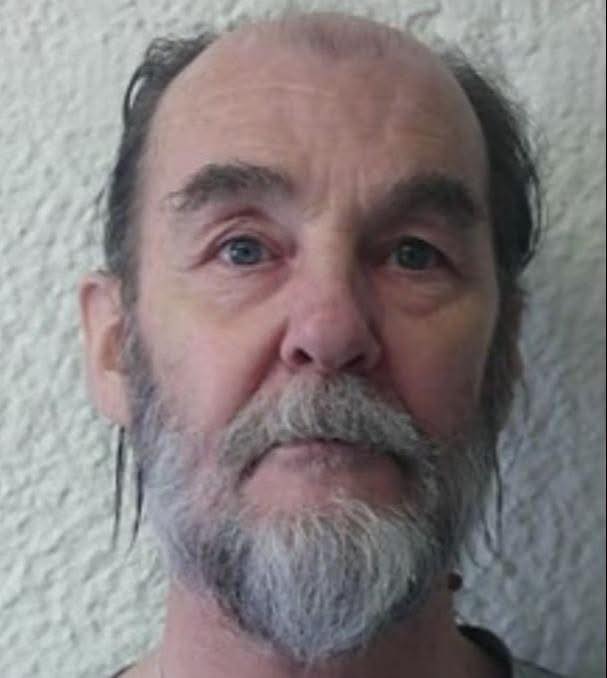Crime
Top barrister urges reopening of Pembrokeshire farmhouse murders case

A PROMINENT criminal barrister has joined the chorus calling for a fresh investigation into the deaths of siblings Griff and Patti Thomas, who were found dead in their isolated Pembrokeshire farmhouse in 1976.
Nearly half a century after the grim discovery at Ffynon Samson in the village of Llangolman, barrister Andrew Taylor is questioning the original findings that suggested Griff murdered his sister before taking his own life. Mr. Taylor, known for his work in overturning wrongful murder convictions, has cast doubt on several pieces of evidence used in the initial investigation.

Dyfed-Powys Police have confirmed that their review of the case remains active.
The bodies of Griff and Patti Thomas were initially found by a postman in December 1976. An inquest in Haverfordwest in February 1977 delivered a verdict of manslaughter for Patti and an open verdict for Griff, leaving unanswered questions about the true circumstances of their deaths.
Mr. Taylor pointed out troubling aspects of the evidence, including a nail found embedded in Griff’s eye with no satisfactory explanation from police or pathologists, and significant bleeding from a head injury which contradicts the absence of third-party involvement. Moreover, the scene contained two half-drunk cups of tea and uneaten food, hinting at the presence of a visitor, and no accelerants were found, which challenges the suicide theory.
These details suggest that the siblings might have been entertaining a known visitor shortly before their deaths, adding complexity to the narrative of a lone murder-suicide.
The case has recently gained additional attention through a new BBC Sounds podcast, “Death on the Farm,” which explores the mysterious circumstances surrounding the deaths.
The podcast follows The Pembrokeshire Herald playing significant roles in reviving interest in the case.
Over the years the newspaper has dedicated extensive investigative resources to questioning the initial police conclusions, which suggested that Griff Thomas killed his sister Patti before setting their farmhouse on fire and perishing in the blaze himself.
In recent years, Herald journalists such as Andy Chandler and Jon Coles have highlighted the inconsistencies in the original investigation, particularly focusing on forensic evidence, such as unidentified fingerprints and the unexplained presence of blood on a sewing machine cover.
Their work, combined with campaigns led by local media outlets like Clebran and community councils, pressured Dyfed-Powys Police to consider reopening the case. Coverage has emphasised that the official verdict, which painted Griff as a murderer despite his physical limitations and severe arthritis, left many unanswered questions
The Herald’s reporting has also been instrumental in debunking earlier theories linking notorious serial killer John Cooper to the deaths of the Thomas siblings. Through detailed interviews with local sources and a focus on forensic gaps in the investigation, these publications have kept the unresolved nature of the case in the public eye, pushing for justice more than 45 years later.
With the launch of Operation Hallam, a forensic cold case review started in October 2022, plus this renewed interest, there now renewed hope that modern investigative techniques might finally provide clarity on this nearly 50-year-old case, answering lingering questions and potentially clearing Griff Thomas’s name.
Crime
Man charged with attempted murder after Carmarthen park incident

57-year-old due in court following alleged knife and stalking offences
A MAN has been charged with attempted murder following a serious incident in Carmarthen town centre last week.
Dyfed-Powys Police confirmed that James McKenna, aged 57, from Carmarthen, has been charged with attempted murder, possession of a bladed article in a public place, and stalking.
The charges relate to an incident in Carmarthen Park on Thursday (Jan 29), which prompted a significant emergency services response and caused concern among residents.
Police have not yet released full details of the circumstances, but officers were seen in and around the park area for several hours following the incident while enquiries were carried out.
McKenna is due to appear before Llanelli Magistrates Court on Thursday (Feb 5).
The Herald understands the case involves allegations of both violence and targeted behaviour towards an individual, with stalking listed among the charges.
Public concern
Carmarthen Park is a popular and busy public space used daily by families, dog walkers and joggers, and incidents of this severity are rare.
The news has prompted concern locally, particularly as the alleged offences include possession of a knife in a public place.
Residents have previously raised questions about safety in parks and open spaces across west Wales, especially during darker winter evenings.
Court proceedings
At this stage, the charges remain allegations and the case will now proceed through the courts.
Magistrates will decide whether the case is sent to Crown Court due to the seriousness of the attempted murder charge.
Further details are expected to emerge during Thursday’s hearing.
The Herald will be attending court and will provide updates as they become available.
Crime
Sex offender jailed after living off grid in Pembrokeshire and refusing to register

Man walked into police station after months avoiding authorities
A CONVICTED sex offender who told police he intended to live “off grid” rather than comply with legal monitoring rules has been jailed after handing himself in at a Pembrokeshire police station.

Christopher Spelman, aged 66, of no fixed address, appeared for sentence at Swansea Crown Court after admitting breaching the notification requirements of the sex offenders register.
The court heard Spelman was released from prison in Dorset on July 4 last year but immediately refused to provide police with an address, despite being legally required to do so within three days.
Instead, he indicated he planned to buy a tent and live outdoors.
Prosecutor Brian Simpson said officers subsequently launched a nationwide search when Spelman failed to make contact with police. Public appeals were issued and his case featured on the television programme Crimewatch.
Detectives believed he had been travelling around the UK using public transport and staying at campsites. He was known to have links to several areas including Merseyside, Manchester, Devon, Cornwall and Hampshire.
His whereabouts remained unknown until January 3 this year, when he walked into Haverfordwest police station and was arrested. It is unclear how long he had been in Pembrokeshire.
Spelman previously served seven years in prison after being convicted in 2014 of 12 counts of sexually assaulting a girl under the age of 14. He was placed on the sex offenders register for life.
The court heard this was not the first time he had failed to comply with the rules. After an earlier release in 2016, he again failed to register his address and avoided police for around five years before being caught.
He has 11 previous convictions for 29 offences.
Defence barrister Andrew Evans described the case as unusual and said his client had long disputed his original conviction and had expressed a wish to live “outside society”.
However, he said Spelman had gradually accepted that he remained subject to court orders and now wanted more stable accommodation and a chance to rebuild his life. The defendant asked the court to impose a custodial sentence so arrangements could be made for his future release.
Judge Geraint Walters noted there were signs Spelman wished to change but warned that any further breaches would result in longer prison terms.
With credit for his guilty plea, Spelman was sentenced to 10 months in prison. He will serve up to half in custody before being released on licence.
Crime
Former Wales rugby star admits Christmas Day drink-driving offence

Ex-Ospreys captain was almost twice over limit in Pembroke town centre
Former Wales back row Jonathan Thomas has admitted driving through Pembroke town centre on Christmas Day when he was almost twice over the drink-drive limit.
This week Haverfordwest magistrates heard that Thomas, 43, was stopped by officers as he drove his Mercedes CLA 220 along The Green, Pembroke, at around 5pm on Christmas Day.
“The officers were very concerned at the manner of his driving, as the car was being driven erratically and was swerving to the other side of the road,” said Crown Prosecutor Sian Vaughan.
“When Jonathan Thomas got out of the car, the officers could see that he was having difficulty standing and was unsteady on his feet.”
Subsequent breathalyser tests showed Thomas had 62 mcg of alcohol in his system, the legal limit being 35.
Thomas, who has no previous convictions, pleaded guilty to the drink-drive charge and was represented in court by solicitor Jess Hill.
“He has family in the area and had travelled to spend time with them on Christmas Day,” she told the magistrates. “He’s very remorseful for his actions and hugely regrets his decision that day.”
Jess Hill concluded by saying that Thomas is currently “between jobs and living off his savings”.
Thomas, who gave his address as Main Road, Bredon, was disqualified from driving for a total of 18 months.
“The length of your disqualification reflects the fact that you were more than a little bit over the limit,” commented the presiding magistrates when imposing sentence.
He was fined £120 and ordered to pay £85 costs and a £48 court surcharge.
The former Wales back row left his role as Swansea RFC head coach at the beginning of December 2025 as a result of ongoing health concerns. He was forced to retire from playing in 2015 on medical advice after being diagnosed with epilepsy and is one of the 390 former rugby union players currently taking part in a concussion lawsuit against the sport’s authorities.
“Long-standing issues linked to the head trauma have caused me some concern recently and it has been impossible for me to give the role everything it needs,” he said in a previous interview with the BBC.
His rugby career started out with Pembroke RFC juniors before moving to Swansea RFC, which he captained when he was 19. He then joined the Ospreys where, over a ten-year period, he won four league titles and an Anglo-Welsh Cup. He was the youngest player to captain the Ospreys and, at the time of leaving, was the joint highest appearance holder, together with Andrew Bishop, on 188 appearances.
His international career saw him play for Wales at Under-16, Youth, Under-19, Under-21 and Sevens levels. He made his senior international debut against Australia in 2003, featured at the 2007 Rugby World Cup and was part of two Six Nations Grand Slam-winning sides in 2005 and 2008. Between 2004 and 2011, Thomas was included in every Wales Six Nations squad. In his appearances for Wales, he scored seven tries.
-

 Health7 days ago
Health7 days agoConsultation reveals lack of public trust in health board
-

 News2 days ago
News2 days agoPrincess of Wales visits historic Pembrokeshire woollen mill
-

 Crime6 days ago
Crime6 days agoPembroke man accused of child sex offences sent to Swansea Crown Court
-

 Crime12 hours ago
Crime12 hours agoSex offender jailed after living off grid in Pembrokeshire and refusing to register
-

 Health3 days ago
Health3 days agoDoctor struck off after sexual misconduct findings at Withybush Hospital
-

 Crime2 days ago
Crime2 days agoHakin man’s appeal delayed again as Crown Court seeks guidance on insurance law
-

 Community6 days ago
Community6 days ago50s women threaten legal action over pension compensation refusal
-

 Business7 days ago
Business7 days agoEight-year prison sentence after vehicle stop uncovers drugs worth over £150,000


























